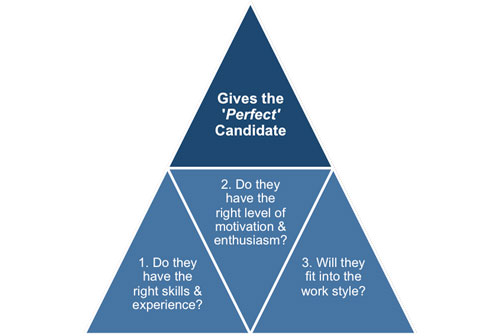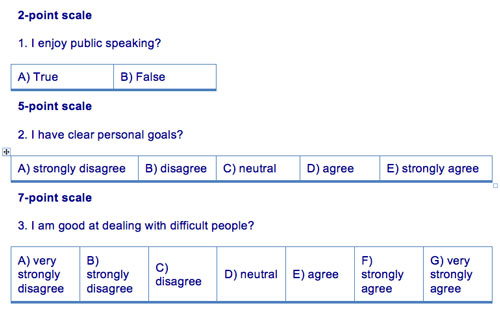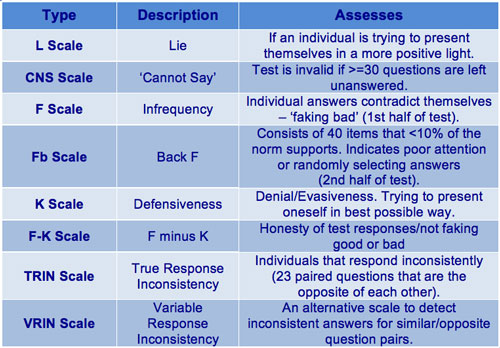Function and Validity Scales
To appreciate how personality questionnaires work you need to consider how an organization will use the results and how they benefit the decision-making process. Organizations want to efficiently select the most able person to perform a role.
They already know what is expected of the role; all they need to find out is which individual possesses the right level and number of the necessary competencies.
 |
The diagram above shows you the three questions any recruitment process must satisfy in order to ensure productivity and harmony are maintained within the organization. It is essential the new individual's personality suits that of the team or group they are to manage or lead.
In response to the increased customer or team focus of roles in the modern workplace, organizations now place greater emphasis on a candidate's personality than they have done in the past. The various personality questionnaires that have already been discussed ask individuals how they feel, think, and behave in a variety of circumstances in order to gauge a person's intrinsic characteristics and personality.
The majority of personality questionnaires present you with between 50-200 questions that ask you to choose from two, five, or seven answers (referred to as point scales). An example of each point scale is shown below.
 |
Some of these questions may appear too simplistic or imprecise to determine your personality. Others are open to interpretation that can vary depending on the circumstances, words, or phrases used and how you feel on that day. For example:
Does the word 'good' in the third question above mean when compared to the public, to people you work with, or to some other group?
What is meant by the phrase 'difficult people'? Does it mean abusive, withdrawn, or self-centered individuals?
It is only when you ask this question with a particular organization or culture in mind that you will find a workable definition in which to answer the question.
It is also important to understand that most personality questionnaires have validity questions built into them. These use a variety of validity scales to ensure as far as possible that people taking the test are being honest and open in their answers. Questionnaires such as the MMPI also judge how many questions you leave unanswered. If this is excessive (over 30) then your results will be seen as invalid.
 |
The table above describes the main validity scales that you need to be aware of when answering a management personality questionnaire. These have been designed to detect anyone trying to 'fake' a personality questionnaire. These validity scales are far from infallible and with a little practice you can become familiar with the styles and formats of questions that are used.
Personality questionnaires designed for management seek to identify the 'best' individual - the one who has most if not all of the personality requirements described in the job specification. Employers will already have evidence of the qualities and competencies that individuals successfully performing the role have. This is what your questionnaire results will be correlated to.
These questionnaires are also designed to show that an individual is honest, has integrity, can control their emotions, and can cope in stressful situations. Stress is seen as one of the biggest threats to productivity because when people turn their anger or frustration in on themselves it results in poor health, antagonism, passive aggression, and in extreme cases violence. Such stresses in the workplace can result in people taking long periods off work, something that all organizations are keen to avoid. That is why organizations use personality questionnaires as one of the means to ensure they take on the 'right' people.
Another reason why some organizations use personality questionnaires is the desire for human resource professionals and recruitment agencies to appear scientific and objective in their work. This may sound rather cynical but in reality many HR and recruitment decisions are based on subjective data and anything that can offer apparent objectivity is often welcomed.
One final point that needs to be made regarding personality questionnaires is that there is a difference between how academic psychologists view them and the claims made for them by commercial test providers.
The following quotes are from David M. Boje, Ph.D., Professor of Management in the Management Department, CBAE at New Mexico State University (NMSU).
'… do not treat the archetype scores of Myers Briggs as anything more than Astrology.'
'The test is not valid or legal to use for personnel assignments, hiring, or promotion. It does not have predictive validity for such uses. It is a useful guide, and no more. Problem is, people go to a workshop, get excited and treat M-B as a secret window into the mind of their co-workers.'
Robert Spillane, Professor of Management at the Graduate School of Management at Macquarie University, argues that research shows that efforts to predict performance from personality and motivation tests have been consistently and spectacularly unsuccessful.
'[Tests] trivialize human behavior by assuming that (fake) attitudes predict performance. Not only is this incorrect but testers offer no explanations for behavior beyond the circular proposition that behavior is caused by traits which are inferred from behavior.'
'The technical deficiencies of most personality tests have been known for many years. Yet they are conveniently ignored by those with vested interests in their continued use.'
You can easily find hundreds of quotes like these, in which noted and published psychologists call into question the use of personality tests. However, the fact remains that they are used in job selection and if you find yourself facing one then it is a good idea to know how best to prepare yourself.
You may also be interested in:
Management Personality Tests | The 'Big 5' Aspects of Personality | Popular Personality Questionnaires | Validity Scales | Defining Your Work Personality | 'Make or Break' Questions.



